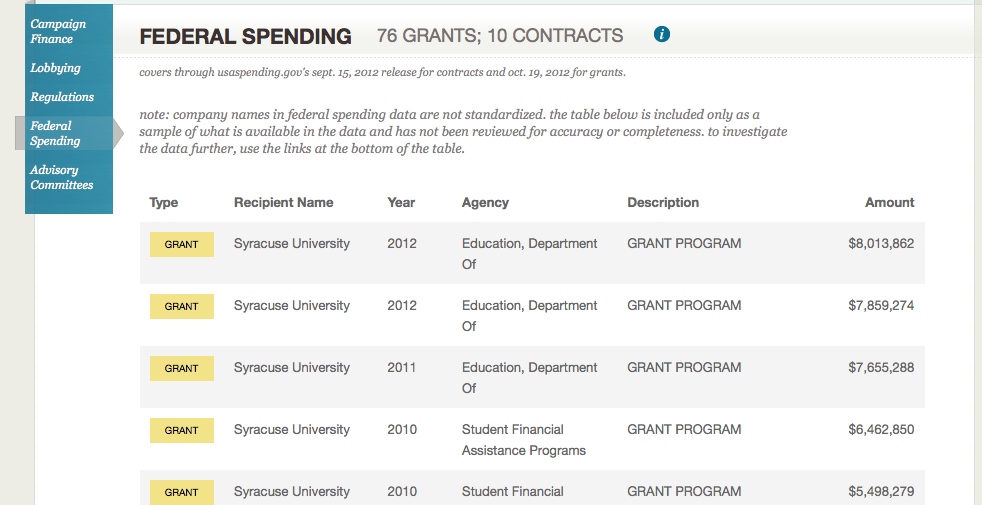Drug abuse and addiction research. Undergraduate tuition. Women’s business ownership assistance.
Those are among the more than 300 grants from the federal government to Syracuse University, a private institution, in last year, according to data from the Sunlight Foundation. It is a non-partisan non-profit organization, headquartered in Washington, D.C., that promotes government transparency.
Some dollar-amounts on SU’s tax support:
- A little more than one fourth of the university’s $1 billion budget comes from federal money.
- In fiscal year 2012, SU received approximately $230 million in federal awards and financial assistance, said Lou Marcoccia, executive vice president and chief financial officer, in an email interview. Marcoccia is responsible for all fiscal matters at SU.
- Much of that money is for tuition assistance for students. In fiscal year 2012, approximately $186 million of SU’s federal funding came from the U.S. Department of Education Student Financial Assistance. That includes the Federal Direct Loan Program, Marcoccia said.
Although SU is a private institution, it is still important and fair for the university to receive public funds, said Gina Lee-Glauser, the university’s vice president for research. Lee-Glauser is responsible for the development of research and research funding at SU.
The federal research money keeps SU competitive against peer institutions, helps attract students and faculty to the university and plays a role in promotion and tenure of faculty, said Lee-Glauser.
The university is mindful of its responsibility to taxpayers, she said. She reminds herself when reviewing projects, she said, “This is the tax payer’s money. Would you pay with your tax dollars for this project?” Lee-Glauser said she reminds herself when reviewing research applications.
The amount federal research support is “inching up,” said Lee-Glauser. When she arrived at SU in 2001, federal research money to SU was at $30 million. Now, about $45 million is for research, Lee-Glauser said.
Lee-Glauser calls herself a matchmaker for the university, someone who can bring together researchers up from different university departments or colleges. For example, a project on cyber-security includes researchers from at least three colleges: The College of Law, School of Information Studies and the Maxwell School of Citizenship and Public Affairs.
In addition to research, federal tax dollars also provide:
- Student Aid: The majority of SU’s federal funding comes in the form of financial aid to students. This aid includes Pell Grants that go to low-income students, and federal work-study funding to pay for student jobs.
- Academic programs: Grants also support programs designed to help specific students or interests at SU. These programs include $25 billion for a photojournalism program for military students in the S.I. School of Public Communications, the Entrepreneurship Bootcamp for Veterans at the Whitman School of Management and cross-disciplinary funding for women in science, technology, engineering and mathematics fields.
- Buildings: Within the past ten years, SU has added seven buildings to campus at a total cost of more than $300 million. But the cost of these buildings was in part funded by government money. For example, the Syracuse Center of Excellence was partly funded by the New York State Foundation for Science, Technology and Innovation and U.S. Department of Energy, among others, according to the SU archives. The building now houses space for research on topics like clean energy and energy efficiency.
Federal dollars sometimes make it possible for research and programs to succeed, said Pat Cihon, president of the SU Chapter of the American Association of University Professors, or AAUP. It is an organization of professors that defends academic freedom and supports professors.
Grants, he said, aid the work of undergraduate and graduate students and professors – especially those in the sciences. Cihon, a professor of law and public policy, received a research grant himself several years ago to study labor laws in Canada.
Grants also help faculty get promotions and tenure, Cihon said. The research and publications of a professor are reviewed when he or she applies for tenure, Cihon said. Without help from beyond the university’s budget, a professor may not be able to do research and would then not meet requirements during promotion review.
The university may be able to provide some funding for a research project, he said, but funding from beyond the university is needed. “In some instances, the university may provide some funding, but it’s limited.” Cihon said. “If they can get it from the outside – so much the better.”
(Dara McBride is a senior with dual majors in business management and newspaper journalism.)
-30-



